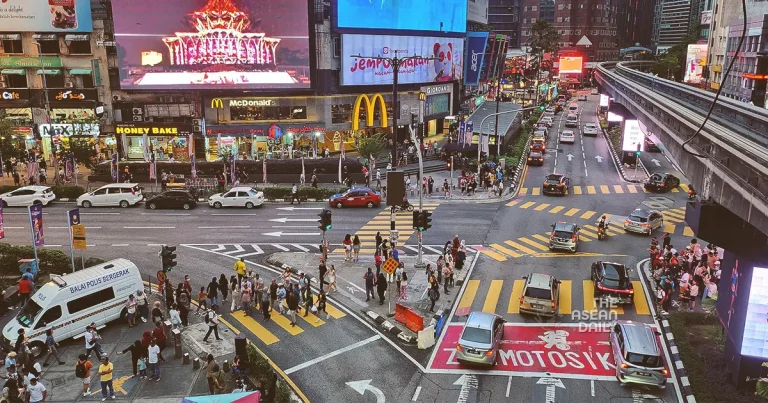24-3-2024 (KUALA LUMPUR) As the Southeast Asian nation of Malaysia stands at a crossroads, the world bears witness to a critical juncture that will shape its destiny for generations to come. The time has arrived for this resource-rich land to shed the shackles of its troubled past and embrace the promise of a new dawn – one that could elevate it to the ranks of the prosperous and free, or consign it to the depths of stagnation and disunity.
In the eyes of many observers, Malaysia’s fortunes could have taken a markedly different trajectory had its leadership been guided by a visionary of the caliber of Lee Kuan Yew, the founding father of modern Singapore. Widely revered as one of the 20th century’s most influential political figures, Lee’s unwavering commitment to meritocracy, good governance, and economic pragmatism propelled the tiny island nation from obscurity to prosperity within a single generation.
Had such a leader been at the helm of Malaysia, a nation blessed with bountiful natural resources and a strategic geographic location, the arc of its development might have been radically altered. Instead of succumbing to the corrosive forces of racial and religious politics, Malaysia could have transcended its divisions, forging a harmonious society rooted in the principles of justice, equality, and the relentless pursuit of progress. Lee’s brand of no-nonsense leadership and his ability to rise above sectarian interests might have been the catalyst that unleashed Malaysia’s true potential.
Alas, history took a different course, leaving Malaysia to grapple with the demons of its past and the consequences of prioritizing power over progress. Yet, even in the face of such daunting challenges, the promise of a brighter future remains within reach – a future that can only be realized through the collective will of a nation committed to the ideals of good governance, transparency, and the embrace of its rich diversity.
The clarion call has sounded for the Southeast nation to cast off the shackles that have bound it for far too long, to reject the siren song of division and embrace the transformative power of national renewal. It is a task that will require courage, conviction, and an unwavering faith in the indomitable spirit of the Malaysian people – a spirit that has weathered the storms of adversity and emerged ever more resilient. A new Malaysia can be forged, a nation that draws strength from its diversity, that harnesses the boundless potential of its people, and that stands as a beacon of hope and progress in a world too often mired in the darkness of conflict and intolerance.
Yet, despite these enviable advantages, Malaysia has struggled to realize its vast potential, hamstrung by a pernicious cycle of racial and religious politics that has stunted its growth and undermined its social cohesion. At the heart of this malaise lies a bitter truth: for far too long, Malaysia’s political elite has prioritized the pursuit of power over the imperative of progress, exploiting the nation’s ethnic and religious fault lines to solidify their grip on the levers of influence.

It is a cynical calculus that has rendered the country a hostage to the whims of those who would sacrifice the greater good for the sake of personal and partisan gain. The recent saga surrounding the sale of socks emblazoned with the Arabic word for “God” serves as a poignant reminder of the delicate fault lines that crisscross Malaysian society. What should have been a minor commercial misstep swiftly escalated into a national conflagration, fueled by the embers of religious fervor and the machinations of those who sought to capitalize on the ensuing outrage.
The swift and draconian sentences meted out to those who dared to voice their dissent on social media, while decried by some as an infringement of civil liberties, were lauded by others as a necessary safeguard against the erosion of religious sanctity. Yet, in the midst of this polarizing debate, a deeper and more insidious reality came into stark relief: the willingness of Malaysia’s political class to stoke the fires of division for the sake of consolidating their own power base.
It is a pattern that has played out time and again, a choreographed dance of provocation and outrage that has served to fragment the nation along ethnic and religious lines, rendering it ever more susceptible to the siren song of populism and the politics of fear. The consequences of this pernicious cycle have been far-reaching and profound, casting a long shadow over Malaysia’s hopes of realizing its full potential as a prosperous and harmonious society.
For in a nation where the bonds of trust and shared identity have been frayed by decades of divisive rhetoric and zero-sum calculations, the very foundations of progress have been undermined, leaving Malaysia adrift in a sea of unfulfilled promises and squandered opportunities. Yet, a glimmer of hope has emerged, a flickering candle in the darkness that dares to challenge the status quo and chart a new course for the nation.
The ascent of Anwar Ibrahim to the prime ministership, after decades of political persecution and personal sacrifice, has raised the tantalizing prospect of a Malaysia that transcends the shackles of its past, a nation that embraces the rich tapestry of its diversity as a source of strength rather than a catalyst for discord.
However, as the honeymoon of Anwar’s tenure fades and the harsh realities of governance set in, the true measure of his mettle will be tested. For while his rhetoric has been lofty and his promises bold, the path to substantive reform is littered with obstacles, not least of which is the entrenched resistance of those who have profited from the perpetuation of the old order.
Indeed, the very nature of Anwar’s ruling coalition, a fragile alliance of disparate forces united only by the exigencies of political expediency, is a reminder of the challenges that lie ahead. For how can a government premised on the accommodation of competing interests and the preservation of the status quo truly chart a bold new course for the nation?
The answer, if there is one, lies not in the pursuit of short-term political gain or the appeasement of narrow sectarian interests, but rather in the cultivation of a broader and more inclusive vision for Malaysia’s future. It is a vision that must be rooted in the principles of good governance, transparency, and the unwavering commitment to upholding the rule of law and the sanctity of the nation’s institutions.
Only by transcending the siren song of racial and religious politics can Malaysia hope to forge a path towards true progress, a journey that will require not only courage and conviction but also a willingness to confront the demons of the past and embrace the promise of a more equitable and just society.
This is not to suggest that such a transformation will be easy or that it will unfold without resistance and setbacks. The forces of reaction and conservatism, those who have long profited from the perpetuation of division and discord, will not surrender their influence willingly. They will employ every tool at their disposal, from the manipulation of public sentiment to the distortion of historical narratives, in a desperate bid to cling to the tattered remnants of their fading hegemony.
Yet, it is precisely because the stakes are so high, and the consequences of inaction so grave, that Malaysia’s leaders must summon the courage to break free from the shackles of the past and chart a new course towards national renewal. For too long, the nation’s potential has been stifled by the machinations of those who would prioritize power over progress, sacrificing the greater good on the altar of personal and partisan ambition.
It is a path that has led Malaysia down a treacherous and ultimately unsustainable road, one that has squandered the nation’s vast resources and eroded the very foundations of social cohesion that are so essential to the pursuit of lasting prosperity and stability. The time has come for a new paradigm, one that recognizes the inherent strength and resilience of Malaysia’s diversity and seeks to harness it as a catalyst for progress rather than a source of division.
It is a paradigm that must be rooted in the principles of good governance, transparency, and the unwavering commitment to the rule of law, one that empowers the nation’s citizens to transcend the narrow confines of race and religion and embrace a shared sense of purpose and belonging. Nonetheless, there’s a strong possibility that this promise will go forever unfulfilled if the focus of Malaysian politicians remains on religious interests and maintaining their grip on power, rather than on the well-being of their people.




